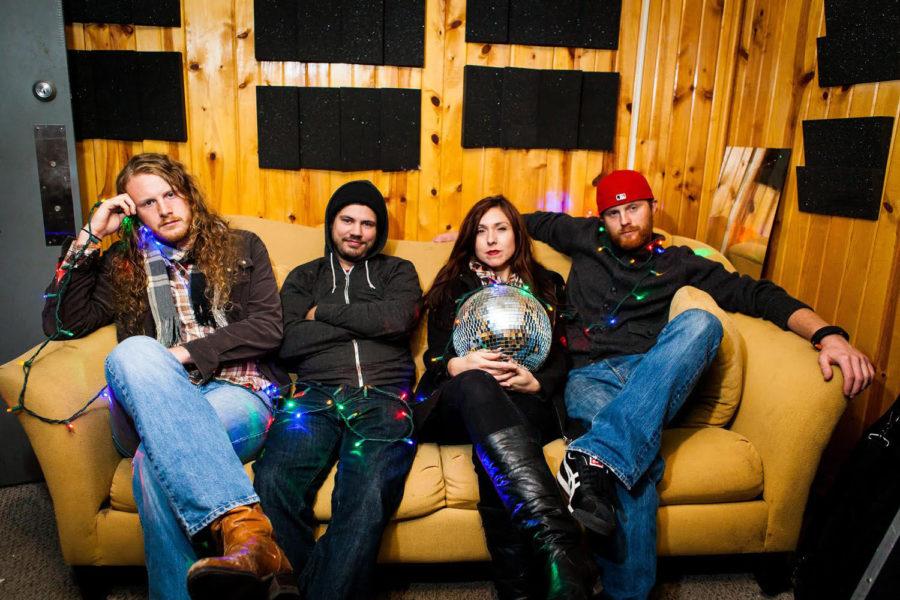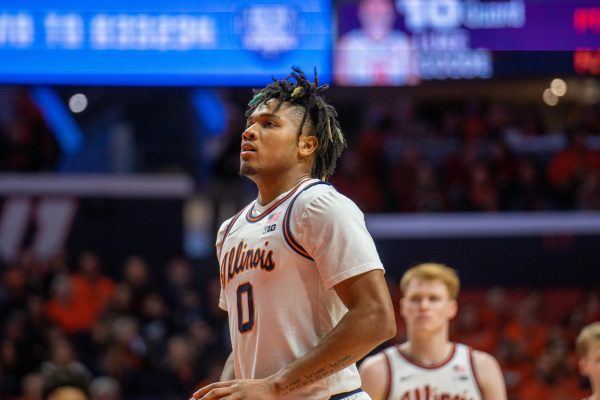The gender tunes of C-U
Kayla Anne, frontwoman and guitarist for We the Animals, has been playing in bands since she was 15 years old in Champaign-Urbana.
March 3, 2015
When it comes to iconic rock stars, the likes of Jimi Hendrix, Keith Richards, and Jimmy Page dominate the pop culture imagery. But over the last decade, more and more top grossing music icons have started to shift the gender ratio.
Taking a closer look at the music industry, it’s evident there is an underrepresentation of women, making some feel two steps behind, creating a gender divide seen within most genres of music.
Many female musicians find that on a larger, national scale, the music industry is too daunting. But in Champaign-Urbana, the gender divide in music feels close to nonexistent for many artists.
Several prominent music festivals in the U.S, including Chicago’s Pitchfork Music Festival, Coachella and Bonnaroo, reflect the gender disparity between male and female performers in the music industry as a whole, according to data collected by Nashville Scene. Of those music festivals, the highest difference between male and female performers is at Pitchfork, where only 28 percent of the performers are female. At Coachella, out of 164 performers, only 28 are female.
This divide is also prevalent in instruments that are weighted by gender stereotypes, discouraging some women from picking up masculine pieces like a guitar and some men from playing feminized equivalents like the flute.
Get The Daily Illini in your inbox!
Vivian McConnell, 2013 University alumna, comes from a background as a frontwoman with her two successful bands that both originated in Champaign: Santah, which has one other female member, and Grandkids. With a cellist in one of her bands, McConnell said that sound system operators often assume it is she who plays the cello, opposed to the guitar.
“I find it exciting and relieving to perform with a band that has a female member, often times because we end up discussing what it’s like to be the only girl in the band,” she said. “In the C-U community, I think there is a really supportive scene for female musicians. I always felt comfortable performing and had a lot of support from other female musicians and friends.”
Within prevalent symphony orchestras in the U.S., the divide between men and women continues. According to composer and programmer Suby Raman, only 38 percent of the Chicago Symphony Orchestra is women.
However, the Champaign-Urbana music community is diverse, with musicians from both ends of the age spectrum, genres that appeal to the most eclectic listener — and a strong female presence.
Ryan Groff, frontman of Elsinore, noted the strong female musicianship that has been on a recent upswing in the community.
“It definitely feels like there has been a huge rise in female musicians who perform well and get attention from the general public. I feel like right now we have the biggest group of talented and popular female musicians and frontwomen than any other time in the past 20 years,” Groff said. “We’re hitting a more gender-equal phase right now.”
However, there are still stereotypes that prevail in all genres of the music sphere.
“I’ve definitely noticed some passive and aggressive sexism since I’ve been a touring musician,” Groff said. “A lot of the time it’s the ‘Oh look, that girl’s playing a guitar and singing!’ thing sneaking around a crowd.”
But in Champaign-Urbana, that discouragement seems to be close to non-existent, according to one of the most prominent figureheads in the music community.
Kayla Brown, frontwoman of We The Animals, has never felt that her gender has prohibited her from functioning as a musician in the C-U community. Brown said that females have unique challenges in a male-dominated scene, but everyone has their own unique challenges.
“The challenges aren’t discouraging; they just make me better at what I do. With the sheer amount of female musicians out here playing regularly, it is a testament to the environment we live and play in,” Brown said.
The environment that Champaign-Urbana brings to musicians can make them forget the harsh realities that the larger picture has on gender inequality.
“There have been a lot of instances where I feel isolated for being the only female in any of the bands playing, but it’s usually because somebody steps out of bounds and says something just plain inappropriate to me, often times without even knowing it,” McConnell said. “I am lucky to say that I have learned how to deal with a lot of this, but C-U was a wonderful place to boost my confidence as a female musician.”
Though women aren’t missing out on opportunities due to their gender, individuals stepping out of the norm and stating inappropriate comments are nothing new to women in the music industry. Alleya Weibel, sophomore in Music and violinist in Tara Terra, feels that sexual harassment is an issue that needs to be addressed.
“I’ve just been to so many shows where people ‘fall in love’ with a singer but don’t make an effort to get to know them outside of what they do on stage. They just cat-call them and that’s it,” said Weibel, who is also an Illini Media employee.
As a promoter at The Highdive for several years, Ward Gollings has seen the music world change with varying trends. He has booked several female musicians, local and visiting, and doesn’t think it is any more difficult for women in the rock industry to survive.
“I don’t think there are only a few (female musicians) these days. In the minority, sure, but there are tons of local female artists in 2015. Twenty years ago there were far less by comparison, but there were far less bands, period, then too,” Gollings said. “A quick glance at the recent Great Cover Up line-ups and over one-third of the acts had female musicians.”
Maddie Rehayem, music editor at Smile Politely and senior in Media, has viewed music inequality as a spectator rather than a performer.
“I never really cared about feminism until I started experiencing it in my own life,” said Rehayem, a former Illini Media employee. “Male privilege and white privilege is a thing, and you can’t truly understand it unless you’ve been affected by it.”







